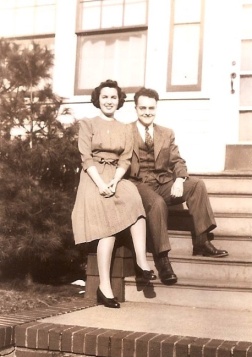One day in early November was the day my father would have been 100 years old. I mentioned it on Facebook for family and friends to see but wasn’t sure I was going to write anything more about it.
Well, 100 years does deserve it’s own post.
My father taught me a lot about history, both history of our family and history of the world because he loved to read about it and see plays about it – and because he lived it, at least to me.
The photo of my father was taken in Brooklyn, New York, when he was about two years old, I would guess, looking a bit scared on a rather large pony. I always thought it a bit odd that he was posed on a pony on a Brooklyn sidewalk. But a few years ago I read a novel about a family who lived in lower Manhattan in the 1920s and 30s. In the story a man brings a pony around so children can be photographed on it. I felt history come alive.
A favorite memory for me was when we visited the Theodore Roosevelt Birthplace National Historic Site with my father and my children. It was supposed to be the first of two activities that day but we spent the entire afternoon in the museum. My father had to examine every exhibit, read every plaque on the wall and every letter in the case. He was observing history the way he liked to do it, absorbed in the experience.
As I wrote in an earlier post, he kept many things that spoke of his history, records like his baptismal certificate, yearbooks from high school and college, and many, many photographs. He loved taking pictures. And thankfully, his family kept photos of my father and his sister, photos that bring me back to a time long before I was born.
My father lived a long life, 92 years, with some heartbreak, his father died when he was young, and much love, with a family he created with my mother, the woman he adored.
Linda Hetzer is an editor and author of books on home design, crafts, and food, and coauthor of Moving On: A Practical Guide to Downsizing the Family Home.
Filed under: elder care, emptying the house, family dynamics, family history, Favorite Downsizing Stories, gratitude, happiness, legacy, mourning, sentimentality about things, writing | Tagged: downsizing the family home, family history, gratitude | Leave a comment »








